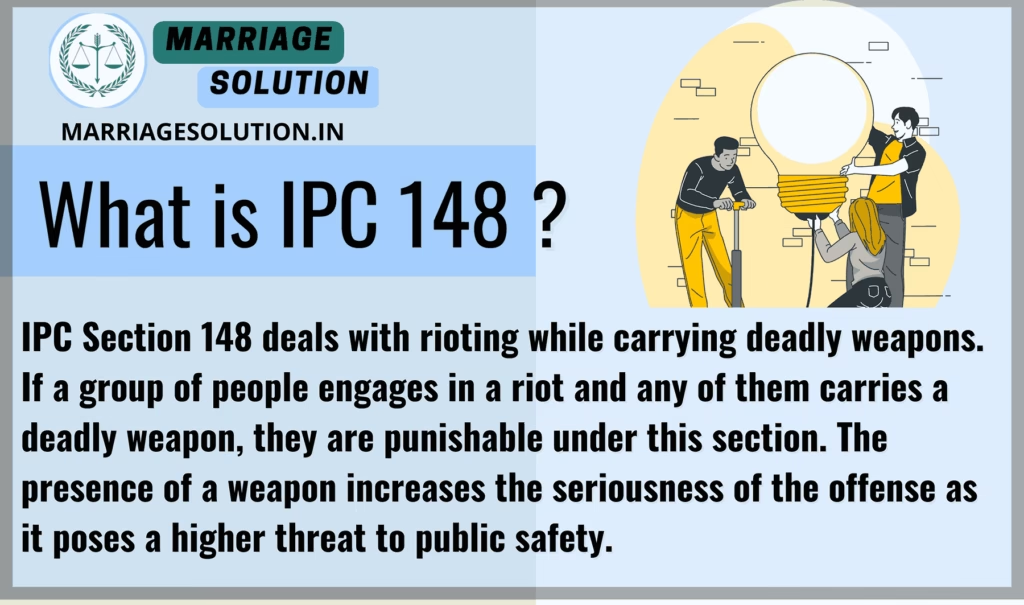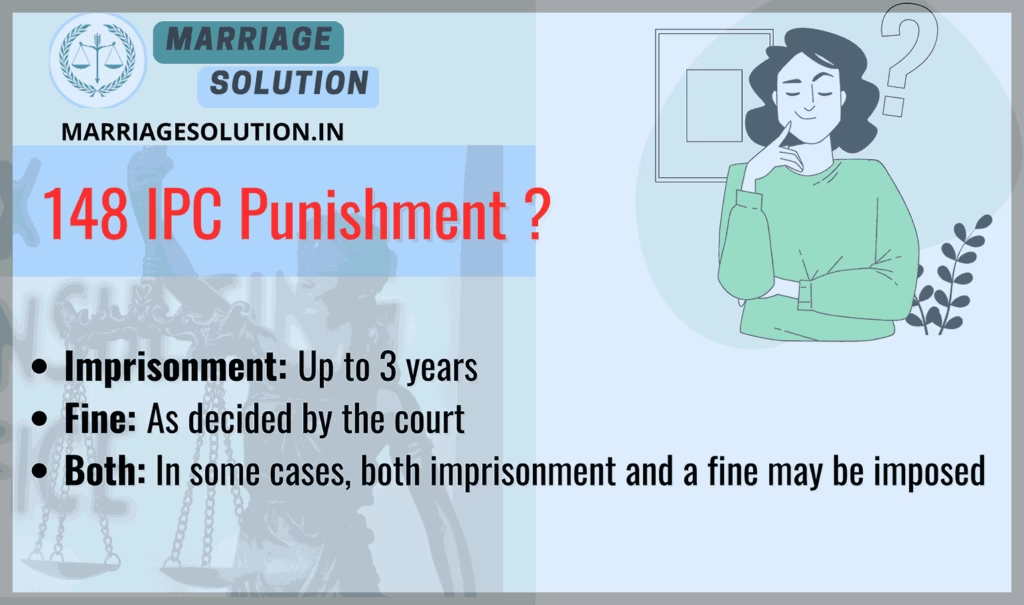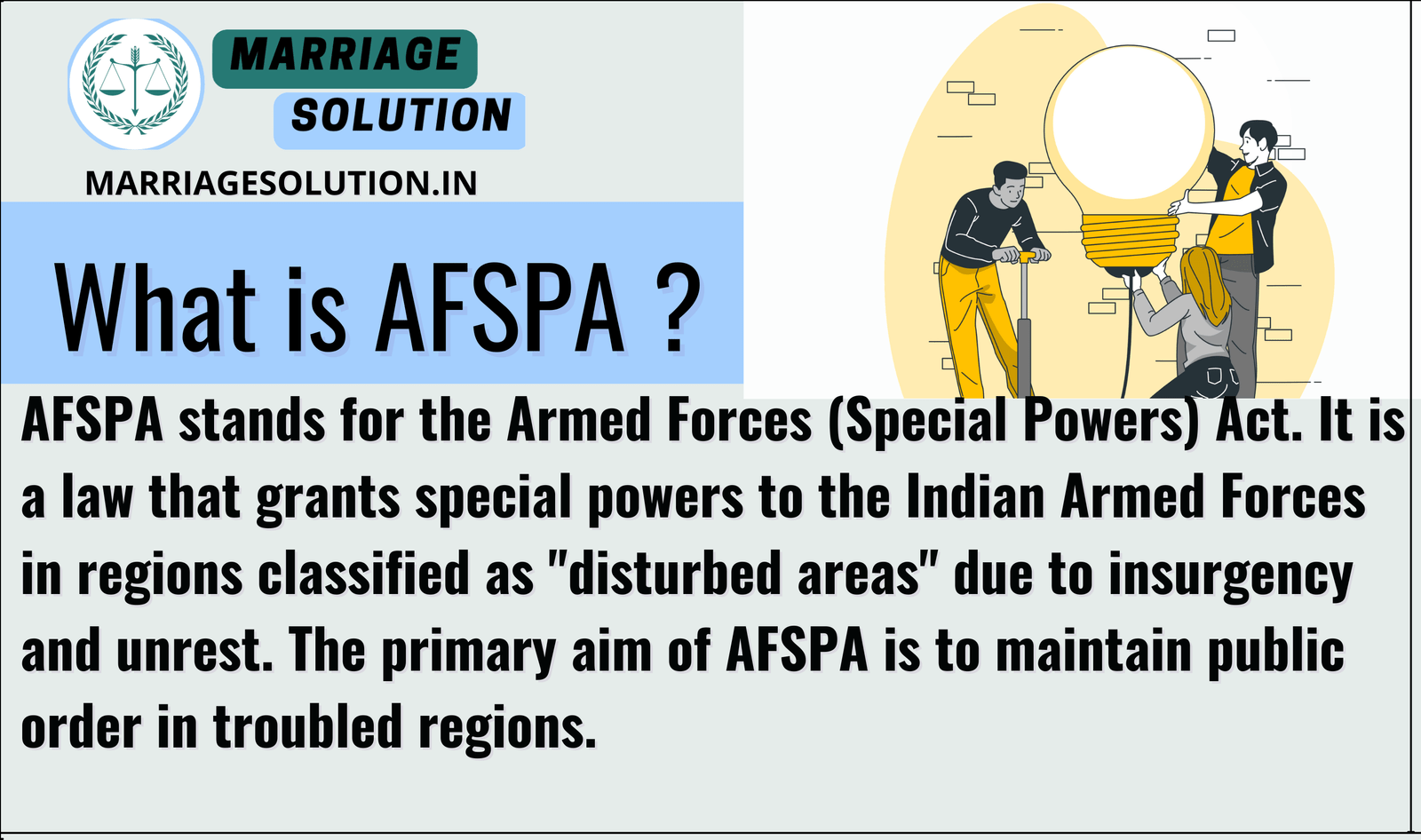Introduction of IPC 148
IPC 148 deals with rioting involving deadly weapons. While IPC 146 and IPC 147 cover general rioting, IPC 148 specifically targets those who carry weapons during a riot. The presence of weapons makes a riot more dangerous, increasing the chances of serious injury or death. Because of this, the law imposes stricter punishments, including imprisonment for up to three years, a fine, or both. The purpose of this section is to discourage people from carrying weapons in unlawful assemblies and protect public peace and security.
- Introduction of 148 IPC
- What is IPC Section 148 ?
- IPC Section 148 Overview
- IPC 148 Punishment
- 148 IPC bailable or not ?
- Section 148 IPC case laws
- Section 148 IPC in short information
- 148 IPC FAQs
- If you need support with court proceedings or any other legal matters, don’t hesitate to reach out for assistance.
What is IPC Section 148 ?
IPC Section 148 deals with rioting while carrying deadly weapons. If a group of people engages in a riot and any of them carries a deadly weapon, they are punishable under this section. The presence of a weapon increases the seriousness of the offense as it poses a higher threat to public safety.

Section 148 IPC in Simple Points
1. IPC 148 Targets Rioters Carrying Deadly Weapons
This section punishes people who participate in a riot while carrying deadly weapons. A deadly weapon is any object that can seriously injure or kill someone. Examples include firearms, swords, axes, sharp glass, or even large stones. Since such riots are more dangerous, IPC 148 ensures that armed rioters face stricter punishment compared to unarmed rioters.
2. Increased Risk to Public Safety
When weapons are involved in a riot, the level of violence and destruction increases. Innocent people, police officers, and even bystanders can get seriously injured or killed. Armed riots can also lead to large-scale panic and property damage. IPC 148 protects public safety by making it illegal to carry weapons in a riotous situation.
3. Individual Responsibility in Armed Riots
Even if only one person in a group carries a weapon, they can be charged under IPC 148. The law does not require all rioters to be armed for a case to be filed. If a person brings a weapon to a riot, even if they do not use it, they can still face legal action. This ensures that everyone in a riot is held accountable for their actions.
4. Harsh Punishment to Deter Armed Rioting
The punishment for rioting with deadly weapons is imprisonment for up to three years, a fine, or both. The law discourages people from carrying weapons during protests, strikes, or violent gatherings. If people know that strict legal action will be taken, they will think twice before participating in an armed riot.
5. Self-Defense is Not Covered Under IPC 148
If a person carries a weapon legally for self-defense and accidentally gets caught in a riot, they cannot be punished under IPC 148. The law only applies to those who willingly participate in a riot with weapons. However, if a person misuses their weapon to attack someone, they can be charged under other IPC sections for assault or murder.
IPC Section 148 Overview
According to IPC Section 148, any person who is a part of rioting while armed with a deadly weapon, or any object that can cause death or serious injury, will be punished. This section ensures strict action against violent mobs using weapons.
10 Key Points of IPC 148 with Detailed Explanations
1. IPC 148 Targets Armed Rioting
This law specifically applies to riots where at least one participant carries a deadly weapon. Ordinary riots under IPC 147 already threaten public order, but when weapons like guns, knives, rods, or chains are involved, the risk of severe injuries and fatalities increases. IPC 148 ensures that such armed rioters face stricter legal consequences.
2. Definition of a Deadly Weapon
A deadly weapon is any object that can cause death or serious harm when used in an attack. This includes firearms, swords, iron rods, large stones, acid, and even sharp glass pieces. Courts determine whether a weapon is deadly based on its potential to cause harm and how it was used during the riot.
3. Intent and Active Participation are Required
To be convicted under IPC 148, a person must be:
- Actively participating in the riot
- Knowingly carrying a deadly weapon
If a person is simply present at the scene but not involved in the violence, they may not be punished under this section. However, courts carefully examine the actions of the accused to determine their role in the riot.
4. Armed Riots Threaten Public Safety
Weapons in riots increase the level of violence and fear among the public. A riot that involves sticks and stones may result in property damage, but a riot where guns, knives, or acid are used can lead to deaths and serious injuries. IPC 148 punishes those who contribute to such dangerous situations, ensuring better public safety.
5. Individual Responsibility in an Armed Riot
Even if only one person in a crowd is carrying a weapon, they can be charged under IPC 148. The law does not require the entire group to be armed. If a person joins a riot with a deadly weapon, they will be held responsible, even if they personally do not use it.
6. Awareness and Knowledge of Carrying a Weapon
For IPC 148 to apply, a person must know that they are carrying a deadly weapon in a riot. If someone accidentally carries a weapon and has no intention to use it, they may not be punished. However, if they are aware of the riot and still bring a weapon, they will be held accountable.
7. Strict Punishments to Prevent Armed Riots
IPC 148 prescribes imprisonment of up to three years, a fine, or both. The reason for strict punishment is to deter people from bringing weapons to riots. If people know they will face harsh legal consequences, they are less likely to participate in armed riots.
8. Protecting Law Enforcement from Armed Rioters
Law enforcement officers are often attacked by armed rioters, making it difficult to control violent situations. IPC 148 helps protect police officers by ensuring that those who carry weapons in riots are punished strictly. This allows police to safely manage riots and maintain public order.
9. Works Alongside Other Rioting Laws
IPC 148 is closely linked with other rioting laws, such as:
- IPC 146: Defines what a riot is.
- IPC 147: Provides punishment for general rioting.
- IPC 149: Punishes those who participate in unlawful assemblies.
These laws work together to regulate public order, with IPC 148 applying specifically when weapons are involved.
10. Self-Defense is Not Considered Rioting
IPC 148 does not apply to people who carry weapons for self-defense but accidentally get caught in a riot. If someone is carrying a weapon legally and has no intention to harm others, they cannot be punished under IPC 148. However, if they use the weapon to attack someone, they can be charged under other sections of the IPC.
Examples of IPC 148
Example 1: Armed Protest Turns Violent
A group of protesters gathered on a highway to demand their rights. Some protesters carried sticks and swords. When police arrived, the crowd attacked them with weapons, injuring several officers. The police arrested those carrying weapons and charged them under IPC 148 for rioting with deadly weapons.
Example 2: Political Rally Becomes a Riot
During a political rally, a group of people started throwing stones and setting vehicles on fire. One person was caught with a gun and was threatening people. Even though he did not fire the gun, he was charged under IPC 148 for participating in a riot while carrying a deadly weapon.
IPC 148 Punishment
- Imprisonment: Up to 3 years
- Fine: As decided by the court
- Both: In some cases, both imprisonment and a fine may be imposed

148 IPC bailable or not ?
Yes, IPC 148 is a bailable offense, meaning the accused can seek bail from the police or court. However, since it is cognizable, police can arrest the accused without prior approval from the court.
Section 148 IPC case laws
Case 1: Street Fight with Knives
- Incident: A group of people got into a street fight. Some of them were carrying knives.
- Outcome: Those with knives were charged under IPC 148 for rioting with deadly weapons. They received harsher punishments than those without weapons.
Case 2: Protest with Batons
- Incident: During a protest, several participants had batons and used them to threaten others.
- Outcome: The participants with batons were arrested under IPC 148 and faced up to three years in prison.
Case 3: Mob with Rocks
- Incident: A mob gathered and some members were throwing large rocks, causing injuries.
- Outcome: Those throwing rocks were charged under IPC 148 for using deadly weapons during a riot.
Case 4: Clash with Chains
- Incident: During a clash between two groups, some individuals used heavy chains as weapons.
- Outcome: The individuals with chains were prosecuted under IPC 148 and given significant fines and prison time.
Case 5: School Riot with Iron Rods
- Incident: In a school riot, a few students brought iron rods and used them to hit others.
- Outcome: The students with iron rods were charged under IPC 148, leading to severe penalties.
Case 6: Political Rally with Firearms
- Incident: At a political rally, some attendees had firearms and fired shots into the air.
- Outcome: The attendees with firearms were arrested under IPC 148, facing long-term imprisonment.
Case 7: Market Brawl with Bottles
- Incident: A brawl in a market involved some people using broken bottles as weapons.
- Outcome: Those using broken bottles were charged under IPC 148 for escalating the riot’s danger.
Case 8: Festival Fight with Machetes
- Incident: During a festival, a fight broke out, and a few participants used machetes.
- Outcome: Participants with machetes were charged under IPC 148 and received strict sentences.
Case 9: Sports Event Riot with Metal Pipes
- Incident: After a sports event, a riot started, and some rioters used metal pipes to cause damage.
- Outcome: The rioters with metal pipes were charged under IPC 148, leading to imprisonment.
Case 10: Village Dispute with Axes
- Incident: A village dispute escalated into a riot, and some villagers had axes.
- Outcome: Villagers with axes were prosecuted under IPC 148 and faced severe consequences.
Comparison of IPC 147, IPC 148, and IPC 149
| IPC Section | Offense | Weapons Used? | Punishment | Bailable? | Cognizable? | Trial By |
|---|---|---|---|---|---|---|
| IPC 147 | General rioting | ❌ No weapons | Up to 2 years or fine or both | Bailable | Cognizable | Magistrate |
| IPC 148 | Rioting with deadly weapons | ✅ Yes, weapons | Up to 3 years or fine or both | Bailable | Cognizable | Magistrate |
| IPC 149 | Unlawful assembly committing an offense | ✅/❌ Both | Punishment same as main crime | Depends | Depends | Magistrate |
Section 148 IPC in short information
| IPC Section | Offense | Punishment | Bailable/Non-Bailable | Cognizable/Non-Cognizable | Trial By |
|---|---|---|---|---|---|
| IPC 148 | Rioting with deadly weapons | Up to 3 years imprisonment, fine, or both | Bailable | Cognizable | Magistrateyes |
148 IPC FAQs
What is the difference between IPC 147 and IPC 148?
IPC 147 deals with general rioting (without weapons), while IPC 148 applies when rioters carry deadly weapons, making it a more serious offense.
Can a person be punished under IPC 148 if they did not use the weapon?
Yes. Even carrying a weapon while participating in a riot is enough to be convicted under IPC 148. Actual use of the weapon is not necessary.
What if a person accidentally gets caught in a riot while carrying a weapon?
If a person did not intentionally participate in the riot, they may not be punished under IPC 148. However, they will have to prove their innocence in court.
Is IPC 148 a bailable offense?
Yes, IPC 148 is bailable, which means the accused can get bail from the police or the court.
What is the maximum punishment under IPC 148?
The punishment is up to 3 years in prison, a fine, or both.
If you need support with court proceedings or any other legal matters, don’t hesitate to reach out for assistance.
Court or any other marriage-related issues, our https://marriagesolution.in/lawyer-help-1/ website may prove helpful. By completing our enquiry form and submitting it online, we can provide customized guidance to navigate through the process effectively. Don’t hesitate to contact us for personalized solutions; we are here to assist you whenever necessary!
Right to Information RTI act :Your Comprehensive Guide (Part 1)
The Right to Information (RTI) Act : Explore the essence of the Right to Information (RTI) Act through this symbolic image. The image features legal documents, emphasizing the importance of transparency and accountability in governance. The scales of justice represent…
What is Article 371 of Indian Constitution ?
Article 371 of the Indian Constitution grants special provisions to specific states and regions within India, addressing their unique historical, social, and cultural circumstances. These provisions aim to accommodate diverse needs and protect cultural identities within the constitutional framework.
Indian Labour law : Your Comprehensive Guide (Part 1)
The purpose of labour laws is to safeguard employees and guarantee equitable treatment at the workplace, encompassing aspects such as remuneration, security, and perks. These regulations establish a secure ambiance by imposing minimum wage requirements, ensuring factory safety measures are…
GST :Your Comprehensive Guide (Part 1 – Understanding the Basics)
The Goods and Services Tax (GST) is like a big change in how we pay taxes in India. It started on July 1, 2017, and it’s here to simplify things. Before GST, we had many different taxes, and it could…





